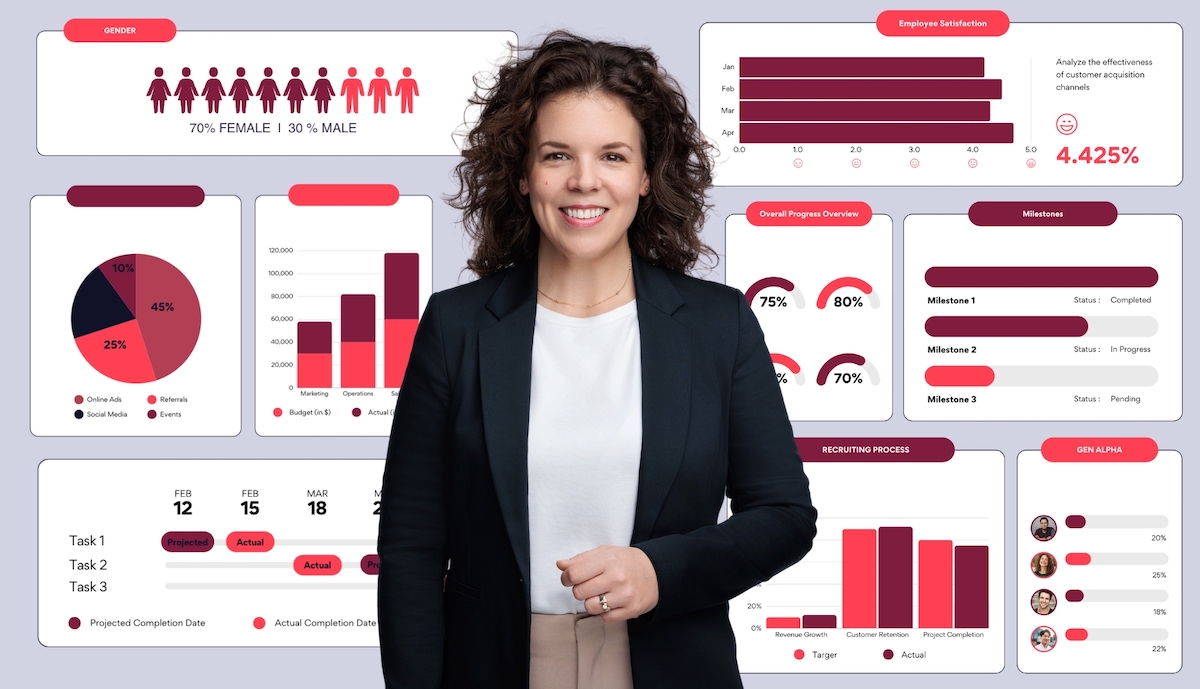Automated recruiting processes & AI
The automation of recruiting processes will continue to be an important focus in 2024. Tools and software that reduce the administrative workload allow repetitive tasks that often take a lot of time to complete to be handled quickly. This includes, for example, the automated analysis of CVs, the management of candidate and customer pipelines and the simultaneous posting of job vacancies on several job boards. The focus here is on increasing efficiency and optimising key recruiting figures.
Artificial intelligence is also being used more and more in recruiting processes. There are clear differences here between companies that deal exclusively with recruiting and those where HR is a sub-division within the company. While every second recruitment agency already uses AI technologies in its processes (in larger agencies, the figure is as high as 60%), only 20% of companies utilise the benefits of artificial intelligence in HR processes (source: Barometer Personalvermittlung 2022). Trend analyses show that AI support in recruiting will also experience a rapid increase in 2024 (source: MC Kinsey HR Monitor 2024). As an HR consultancy, we are also noticing a sharp increase in the use of AI in the recruiting sector. The application is mainly focused on the search for candidates in various social networks, the optimisation of job advertisements and the analysis of application documents. AI technologies significantly reduce the time required for these tasks. However, with the increased use of AI in pre-selection, it is important that companies pay attention to data security and ethical aspects, especially with regards to potential bias and discrimination. The implementation of AI in recruitment therefore requires careful handling. A balance between human intuition and machine efficiency is the key to a successful recruitment process in the age of AI.
It is crucial for employees to familiarise themselves with modern AI systems. The correct use of AI will be an important skill on the labour market in the upcoming years.
In our blog article "Efficient recruiting with ChatGPT ", we take a detailed look at how ChatGPT can be used as a helpful HR assistant.
Growing awareness of diversity and inclusion
Due to stricter guidelines, the topics of diversity and inclusion (D&I) are becoming increasingly important. The Social Pillar of the ESG Directive obliges companies to monitor and disclose their D&I key figures. But this is not the only reason for the increasing importance of D&I. More and more companies are recognising that diverse mindsets and backgrounds play an important role in corporate success. For example, these key figures influence the recruitment and promotion strategies of many organisations. The young generations (Gen Z & gen alpha) in particular attach great importance to diversity and inclusion when choosing their employer. According to an international study on Gen Z conducted by the UN, 45% of the participants surveyed stated that diversity in terms of ethnicity and gender is a high priority for them. More companies are expected to invest in D&I initiatives and introduce innovative assessment tools to minimise bias in the recruitment process.
Increasing importance of salary transparency
The high costs of living means that jobseekers are increasingly demanding higher salaries. According to hokify's Applicant Report 2024, a higher salary is the most frequently cited reason for changing jobs. In our annual survey on the topic of "New year, new job", our surveyed candidates also rated a higher salary as the biggest motivator for changing employers. This stands in contrast to a stagnating economic growth, which is a considerable challenge for companies. In such an economic climate, salary transparency is becoming increasingly important, both to attract and retain employees. Especially among younger employees, the topic of salary is largely discussed very openly and transparently. Communicating pay and benefits openly can help build trust between employers and employees and ultimately contribute to a more balanced and fairer environment. Salary transparency also plays an important role in the fight against gender pay gaps. Legislative measures in this area are increasing and setting new standards for openness and equal pay.
Work-life balance and work-life integration - two models that are very important in the modern working world. While one method focuses more on the optimal mix of professional and private life, the other draws clear boundaries between the two areas. However, both models have the same intention: to equally prioritise both professional and private goals.
Work-life integration is not only about finding a balance between professional and private life, but also about combining the two. This model enables employees to achieve their individual career goals and still fulfil their personal obligations. For example, employees can plan their working hours around any childcare commitments or their individual productivity phases. Key to the success of this approach is the evaluation of work performance based on results rather than working hours.
However, there is also a clear counter-trend towards mixing private and professional life. An "always available culture" has developed as a result of working from home, remote working, etc. Employees are increasingly suffering from the pressure to always be available, even outside of working hours.
In addition, there has also been a steady increase in the desire for a "job with purpose" on the labour market as part of work-life integration. Applicants want to live out their passions not only in their private lives, but also professionally (source: MC Kinsey HR Monitor 2024). This increasing expectation of highly qualified applicants to find a deeper meaning in their work is a challenge for companies in the competition for the best talents.
"Many employees are trying to draw clear boundaries between work and private life and no longer mix these two areas so much. It's not about prioritising one or the other. Luckily, there are so many different working models today. There's something for everyone!"
Matthias Schulmeister, Managing Director of Schulmeister Management Consulting
A strong employer brand
The battle for the best talents is getting tougher and tougher. That's why a strong employer brand is essential. It is no longer enough to simply define corporate values and publish them on your website. It is essential that these values are also embedded in the company's everyday practice and that the benefits are clearly communicated to the outside world. Flexible working hours as benefits are nice to have, but how is this actually implemented in everyday working life? Does the actual working life match this image?
Improving the candidate experience
To attract the best talents, a positive candidate experience throughout the entire recruitment process is crucial - especially with regards to a quick response to applications. In a survey on the candidate experience in application processes from 2023, 25.9% of respondents stated that they waited a maximum of one week for feedback (source: Softgarden). In comparison: in 2020, this figure was still 15.9%. With the help of modern technologies, recruiting processes can be made faster and more efficient. As a result, applicants are used to quick feedback. In addition, the dynamic labour market often means that new employees are needed as quickly as possible, which in turn inevitably speeds up the recruiting process.
In order to review and improve the candidate experience, companies should take their applicants' feedback into account and also proactively ask for feedback on a regular basis. Conversely, the desire for personalised feedback is also growing on the candidate side. For example, recruiters can record a short video to give more advanced candidates brief feedback on their application. This makes applicants feel taken seriously and valued.
Increasing influence of Gen Z and Gen Alpha

Gen Z (born between 1997 and 2009) and Gen Alpha (born between 2010 and 2024) - two groups that will shape the future labour market. Gen Z is largely already active on the labour market and values flexibility and appreciation in the job. Their decisions are strongly value-driven - with sustainability and diversity being of particular importance (source: Forrester Research Study 2023). This generation has clear preferences for companies that represent their values. Gen Z also scores highly with a pronounced affinity for technology. They strive for a good work-life balance and are highly adaptable.
The next Generation Alpha will enter the professional world in the coming years. Gen Z's demands on the labour market are a matter of course for Gen Alpha. This generation has grown up with digital technologies from an early age, which is why digitalisation and modern technologies are a necessary standard for them in the workplace. Gen Alpha values a relationship of trust in the work context as well as innovative approaches and customised solutions that are tailored to their personal needs (strong needs orientation). In order to reach Gen Alpha, fast, informal and preferably digital communication is necessary, such as live chat functions, etc. (source: hokify Bewerber:innen Report 2024). It is crucial to build a relationship with them early on. A strong sense of belonging is important for Gen Alpha, to which they respond with loyalty. Recruiting strategies should therefore be designed for long-term retention. A consistent presence in the media and on the platforms that Gen Alpha uses can help to create brand recognition through regular content. By sharing content that reflects the values and interests of Gen Alpha, companies create a connection that goes beyond the mere job posting and forms the basis for a bond with future employees.
Here is a brief summary of measures to reach the younger generations in a targeted manner:
- Recruiting and employer branding measures should focus on platforms such as Instagram, Tiktok & Co.
- Gen Z and Gen Alpha feel particularly drawn to humorous video content.
- Companies should use employer branding measures to retain potential employees as early as possible.
- The aim is to create jobs that meet the needs of these young talents, promote them and retain them in the company in the long run.





